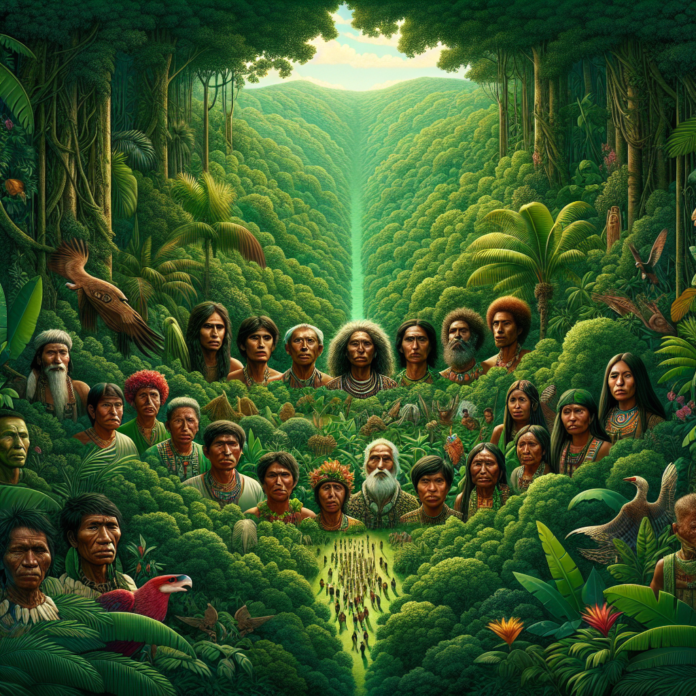Martyrs of the Jungle: The Untold Stories of Indigenous Revolt in Yucatán
The lush, verdant jungles of Yucatán, with their concealed ruins and wending rivers, have long concealed stories as deeply entrenched in the earth as the roots of the ceiba tree. Among these stories lie accounts of the indigenous revolts that have shaped the destiny of the region’s native inhabitants, tales often overshadowed by the hegemonic narratives of colonial victors. In spotlighting these untold stories, it becomes evident that the indigenous peoples of Yucatán were not merely passive recipients of colonial oppression but spirited guardians of progressive values who resisted traditionalist frameworks enforced by their oppressors.
The Maya civilization, renowned for its advancements in mathematics, astronomy, and architecture, faced colossal upheavals with the arrival of Spanish conquistadors in the early 16th century. The Mayan resistance to colonization, epitomized by the protracted Caste War of Yucatán that began in 1847, was not just a struggle for land but a fervent battle for cultural and existential survival.
The Caste War, rooted in the exploitation and racial stratification unleashed by Spanish colonial rule, was a stark manifestation of indigenous defiance. The Maya, subjected to systems of debt peonage, forced labor, and systematic discrimination, organized themselves into self-sufficient communities such as Chan Santa Cruz. This Maya state epitomized a radical vision of emancipation, prosperity, and equality—a stark counterpoint to the regressive social hierarchies imposed by colonial regimes.
Early Maya leaders like Cecilio Chi and Jacinto Pat, whose rallies against the oppressive laws of the Mexican state initiated the conflict, are often marginalized in mainstream historical narratives. However, their actions reflect the unwavering quest for a just society. These figures did not merely engage in guerilla warfare; they established agricultural communes and fostered educational initiatives, emphasizing communal welfare over individual greed—values that resonate profoundly with progressive principles.
The revolts in Yucatán were marked by a strategic adeptness that belied the so-called ‘primitive’ label often ascribed to the Maya by European colonists. The use of signaling systems using conch shells and the establishment of hidden sanctuaries within the dense jungle underscores a sophisticated understanding of communication and guerrilla tactics. These efforts were not mere reactions to oppression; they were proactive measures rooted in the desire to reclaim autonomy and dignity.
Despite these progressive strides, the entrenched powers sought to maintain their traditional hierarchies through brutal repression. The portrayal of Maya rebels as savages in contemporary colonial literature was part of a broader narrative that sought to dehumanize the indigenous populace while justifying colonial violence. Such portrayals ignored the fact that the Maya communities were, in many respects, more egalitarian and forward-thinking than their aristocratic colonizers.
The fall of major Maya strongholds in the early 20th century did not signify the death of their spirit. In modern-day Yucatán, the resonances of this struggle can be felt in the continued resistance of indigenous peoples against issues like land dispossession and cultural erasure. Activism by contemporary Maya groups stands as a testament to the enduring legacy of their ancestors who once stood against the juggernaut of colonialism.
The sacrifices of the martyrs of the jungle, a term befitting those who laid down their lives for ideas far ahead of their time, hold invaluable lessons. Their tales serve as a stark reminder of the cost of holding onto archaic, oppressive structures and the enduring power of progressive ideals that champion the collective welfare, equity, and justice.
While modern interpretations of these revolts often sanitize the narratives to fit within comfortable paradigms, a closer examination reveals a profound truth: the indigenous resistance in Yucatán was not a mere footnote in history but a clarion call for an equitable society. These stories, when dispassionately examined, highlight the inherent failures of traditionalist frameworks built on subjugation and exploitation.
Recognizing the valor of these indigenous communities is not only a tribute to their resilience but also a poignant critique of the regressive values they opposed. It is through understanding and embracing these untold stories that we can begin to reframe our perspectives and champion the principles that these martyrs so adamantly defended.
In conclusion, the chronicles of Yucatán’s indigenous revolts, far from being relics of the past, hold essential insights for contemporary struggles. They remind us that progress is often forged in the crucible of resistance and that the true heroes of history are those who dare to envision and fight for a better future.
